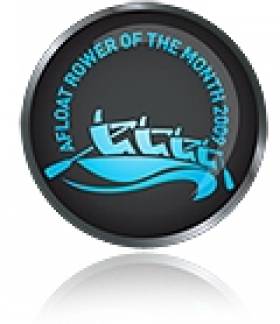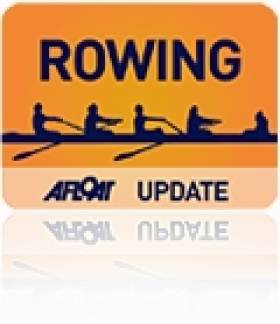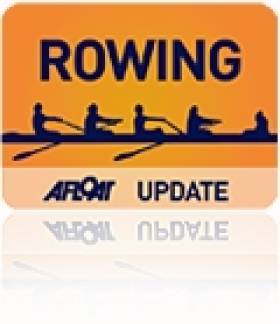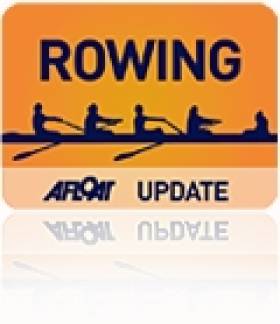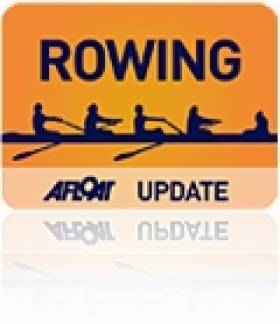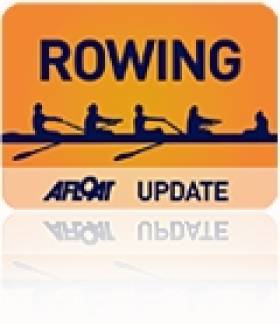Displaying items by tag: double
#ROWING: The Afloat Rowers of the Month for May are Paul and Gary O’Donovan. The brothers from Skibbereen formed the Ireland lightweight double which finished fifth at the European Rowing Championships in Poznan in Poland. They produced a very good performance in their semi-final to take third and so qualify for the A Final. In that race, they won a battle for fifth with Turkey. The winning crew, France, produced a European best time. The lightweight double is an extremely competitive event, but the new Ireland crew has hit the ground running.
Rower of the Month awards: The judging panel is made up of Liam Gorman, rowing correspondent of The Irish Times and David O'Brien, Editor of Afloat magazine. Monthly awards for achievements during the year will appear on afloat.ie and the overall national award will be presented to the person or crew who, in the judges' opinion, achieved the most notable results in, or made the most significant contribution to rowing during 2015. Keep a monthly eye on progress and watch our 2015 champions list grow.
New Ireland Double 11th at World Rowing Championships
#ROWING: Ireland’s women’s double of Monika Dukarska and Helen Hannigan (Walshe) finished fifth in their B Final at the World Rowing Championships in Amsterdam this morning. The race was won by the Netherlands, who got out in front early and held off challenges by Germany and Russia. Ireland started well but slipped back to sixth position. However, the crew dug in and won a battle with Denmark for fifth. They finished well, closing up on fourth-placed Ukraine coming up to the line. The placing puts Ireland 11th in this Olympic-class event.
World Rowing Championships, Day Eight (Irish interest, selected results):
Women
Double Sculls – B Final (Places 7 to 12): 1 Netherlands 5:06.20, 2 Russia 5:09.13, 3 Germany 5:09.17, 4 Ukraine 5:14.12, 5 Ireland (H Hannigan, M Dukarska) 5:16.36, 6 Denmark 5:16.55.
#ROWING: Ireland’s new women’s double of Helen Hanningan (neé Walshe) and Monika Dukarska made a significant breakthrough at the World Rowing Championships in Amsterdam today, qualifying for the A/B Semi-Finals. The target was a place in the top two of their repechage. Romania made the early pace, with Ireland and the United States joining them in the challenge. By the closing stagest the US had their place sewn up, while Dukarska and Hannigan took out Romania to enter the top 12 crews at the Championships.
World Rowing Championships, Day Four (Selected Results; Irish interest)
Men
Lightweight Single Sculls – Quarter-Final (First Three to A/B Semi-Finals; rest to C/D Semi-Finals): 1 Germany (L Hartig) 7:13.67, 2 Ireland (P O’Donovan) 7:14.76, 3 Denmark (S Jensen) 7:33.91; 4 Azerbaijan 7:25.84, 5 Russia 7:33.91, 6 Algeria 7:43.76.
Women
Double Sculls – Repechage Three (First Two to A/B Semi-Final: rest to C/D Semi-Final): 1 United States (M O’Leary, E Tomek) 7:18.10, 2 Ireland (H Hannigan, M Dukarska) 7:21.14; 3 Romania 7:22.87, 4 Estonia 7:48.85.
Fourth for Hannigan and Dukarska in First World Rowing Test
#ROWING: The new Ireland women’s double scull of Monika Dukarska and Helen Hannigan (neé Walshe) took fourth in their heat at the World Rowing Championships in Amsterdam today. Lithuania and the Ukraine fought it out at the head of the field, with Lithuania pulling away at the end. Ireland were in third at 1500 metres but yielded this to Denmark at the finish.
The Ireland women’s four were off the pace in their heat and finished fifth. The New Zealand four were extremely impressive in their win, and France held off Canada to take the second qualification spot for the A Final.
World Rowing Championships, Amsterdam, Day Two (Selected Results, Irish interest)
Men
Lightweight Pair – Heat Two (First Two to A/B Semi-Finals; rest to Repechage): 1 Ireland (M O’Donovan, N Kenny) 6:53.54, 2 China (Zhenwei Hou, Fanbing Zhang) 6:54.57; 3 Switzerland 7:03.74, 4 Australia 7:10.31, 5 Bulgaria 7:13.05, 6 Austria 7:19.39.
Women
Four – Heat One (First Two to A Final; rest to Repechage): 1 New Zealand 6:46.42, 2 France 7:01.16; 3 Canada 7:03.68, 4 Italy 7:09.17, 5 Ireland (M O’Neill, E Tormey, A Keogh, B O’Brien) 7:19.28.
Double Sculls – Heat One (Winner to A/B Semi-Finals; rest to Repechage): 1 Lithuania (D Vistartaite, M Valciukaite) 7:05.28; 2 Ukraine 7:09.74, 3 Denmark 7:24.04, 4 Ireland (H Walshe, M Dukarska) 7:24.59, 5 Austria 7:29.06, 6 Bulgaria 7:49.72.
#WorldJuniorRowing: The Ireland men’s double scull of Jack Casey and Andy Harrington missed out on a place at the semi-finals at the World Junior Rowing Championships at Trakai in Lithuania this morning. In tailwind conditions, Romania set a hot pace in the quarter-final, with Britain and Lithuania coming closest to matching them. The first three places were the crucial ones and Ireland were in touch to half way. But in the second half, the top three moved away and Ireland ended up sixth. Lithuania took second from Britain coming up to the line.
World Junior Rowing Championships, Trakai, Lithuania, Day Three (Selected Results, Irish interest)
Men
Double Sculls – Quarter Final One (First Three to A/B Semi-Final; rest to C/D Semi-Final): 1 Romania 6:21.73, 2 Lithuania 6:25.62, 3 Britain 6:26.80; 4 Russia 6:36.37, 5 Croatia 6:40.91, 6 Ireland (A Harrington, J Casey) 6:41.41.
Ireland Women's Double Finishes Eleventh at World Cup
Ireland’s Lisa Dilleen and Sanita Puspure finished fifth in the B Final of the women’s double scull at the World Cup rowing regatta in Lucerne. This places the Irish 11th overall. Belarus and the United States were the two top crews down the course with Belarus striking for the finish first and taking first. The race featured four of the crews which competed in the A Final at Munich, where Dilleen and Puspure also finished fifth.
World Cup Regatta, Lucerne – Day Three (Irish interest)
Women
Double Scull – B Final (Places 7 to 12): 1 Belarus 7:03.19, 2 United States 7:04.44, 3 Italy 7:08.71, 4 Romania 7:09.08, 5 Ireland 7:10.29, 6 China 7:14.83.


























